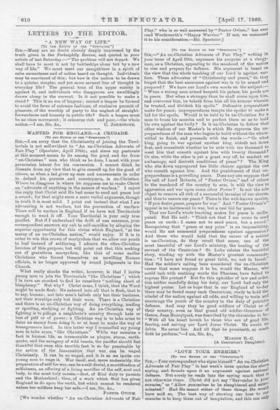[To TUE Burton OF TUM "SPEOTATOR.1 SIR, —" un-Christian Advocate of
Fair Play," writing in your issue of Apri110th, expresses his surprise at a clergy- man, as a Christian, appealing to the manhood of the nation to rise and prepare few defence. His argument is based on the view that the whole teaching of our Lord is against war- fare.. These advocates of "Christianity and peace," do they forget that the best assurance against way is to be armed and prepared ? We have our Lord's own words on the subject "When a strong man armed keepeth his palace, his goods are in peace. But when a stronger than he shall come upon him, and overcome him, be taketh from him all his armour wherein he trusted, and divideth his spoils." Defensive preparations make for peace; unpreparedness tempts the spoiler to make a bid for the spoils. Would it be held te be un-Christian for a man to brace his muscles and to perfect them so as to hold his own against the bully P Is it un-Christian to follow that other wisdom a our Master's in which He reproves the un- preparedness of the man who begins to build without the where- withal to finish, and proceeds with the words :—" Or what king, going to war against another king, sitteth not down first, and consulteth whether be be able with ten theusand to meet him that cometh against him with twenty thousand ? Or else, while the other is yet a great way off, be sendeth ambassage, and desireth conditions of peace" ? The King who sits down unprepared has little chance against the one who cometh against him. And the punishment of that un- preparedness is a grovelling peace. Does auy one suppose that the call of Lord Roberts, of "Pastor Ovium," and of others to the manhood of the country to arm, is with the view to aggression and war upon some other Power P Is not the sole object to remove all risk of a successful invasion of our shores. and thus to ensure our peace ? There is the well-known maxim, "If you desire peace, prepare for war." And "Pastor Ovium's" appeal is no incitement to war, but a real bid for peace.
That our Lord's whole teaching makes for peace is unclip
puted. But He said: "Think not that I ant come to send peace on earth : I came not to send peace, but a sword." Recognising that "peace at any price" is an impossibility, would He not commend preparedness against aggression P And those who would bold that the career of a soldier is un-Christian, do they recall that scene, one of the most beautiful of our Lord's ministry, the healing of the servant of the Centurion? St. Luke relates the beautiful story, winding up with the Master's greatest commend; tion : "I have not found BO great faith, no, not in Israel.' Had the soldier's calling been considered the un-Ohristian career that some suppose it to be, would the Master, who could lash with scathing words the Pharisee, have failed to express His protest P But for this upholder of law and order, this soldier manfully doing his duty, our Lord had only the highest praise. Let us hope that in our England of to-dal there may be found many such Centurions, ready to hold the citadel of the nation against all odds, and willing to train and encourage the youth of the country in the duty of patrioiie defence. And may they be good soldiers of Christ as et their country, even as that grand old soldier- Governor et Genoa, Jean Boureiquat, was described by the chronicler to be "With all his heart loveth he those who are of good life, fearing, and serving cur Lord Jesus Christ. He oweth 0° debts. He never lies. And all that he promiseth, so much doth he perform."—/ am, Sir, &c.,
MARrolc R.-C.
(A. Centurion's Daughter).






































 Previous page
Previous page